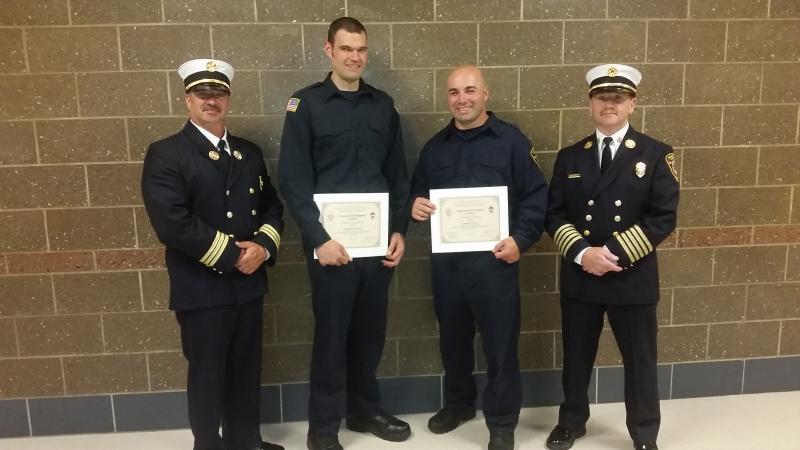Dartmouth firefighters graduate from training program
Two of Dartmouth's firefighters have completed a recruit training program that teaches everything from hazardous material mitigation to stress management.
Dartmouth Fire District 3 firefighter Michael Franco and Mathew Seland, along with 34 classmates from around the region, graduated from the Call/Volunteer Firefighter Recruit Training program on June 10.
Certificates of completion were presented to the graduates of Class #53 during a ceremony at the Matthew Kuss Middle School in Fall River.
The training program, which is operated through the Massachusetts Firefighting Academy, delivers a standard recruit training curriculum, meeting national standards, on nights and weekends to accommodate for firefighters’ busy schedules.
In 2014, an online blended format was implemented that has students doing more work outside of class and taking quizzes online, granting students the ability to better control their workloads. Working outside the classroom also gives students more time to train with instructors.
In the state’s firefighting program, students learn the skills needed to respond to fires and to contain and control them. Students receive classroom training in all basic firefighter skills. They first practice under non-fire conditions and then move on to controlled fire conditions.
“The academy trains and certifies the recruits to the Standard for Firefighter Professional Qualifications. This is the national standard for firefighter training and certification, but the responsibility lies with each community to dictate the firefighter training standard in their own community,” said Richard Arruda, fire chief of district 3.
Firefighters are expected to handle chemical and environmental emergencies, ranging from the suspected presence of carbon monoxide to a gas leak. They may be called to rescue a child who has fallen through the ice, rescue people from stalled elevators or rescue drivers trapped in vehicle accidents.
To ensure that new firefighters are prepared to handle those jobs, the program covers a wide array of topics.
The intensive program includes classroom instruction, physical fitness training, firefighter skills training and live firefighting practice. Students must put in 240 hours of training to graduate.
Students must also demonstrate proficiency in life safety, search and rescue, ladder operations, water supply, pump operation and fire attack. Fire attack operations range from mailbox fires to multiple-floor or multiple room structural fires.
“Both firefighters are now serving a one-year probationary period where they will continue to train with our fire instructors and fellow firefighters in all aspects of the work we perform,” said Arruda.














